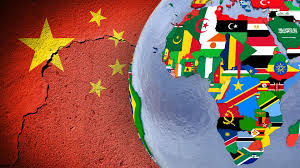Is China's economic involvement in Africa helping to develop the continent, or is it creating a new form of dependency through "debt-trap diplomacy"? By Hugo Keji

China's economic involvement in Africa is a complex and multifaceted issue, with arguments both supporting and criticizing its impact on the continent. On one hand, China's investment in Africa has fueled infrastructure development, boosted trade, and provided financial assistance to African countries. On the other hand, critics argue that China's approach may be creating a new form of dependency, often referred to as "debt-trap diplomacy," where African nations become over-reliant on Chinese loans, risking their economic sovereignty.
Arguments Supporting China's Economic Involvement in Africa:
-
Infrastructure Development: China's investments have significantly improved infrastructure in African countries. Through initiatives like the Belt and Road Initiative (BRI), China has funded and constructed projects such as roads, railways, ports, and energy plants across the continent. These developments are crucial for unlocking Africa’s economic potential, reducing transportation costs, increasing trade, and attracting further investment.
- For example, China financed and built Kenya's Standard Gauge Railway, linking Nairobi to Mombasa, improving trade connectivity.
- In Ethiopia, the Addis Ababa-Djibouti Railway has shortened the travel time for goods between the landlocked country and its main port in Djibouti.
-
Trade and Economic Growth: China has become Africa's largest trading partner, with trade volumes exceeding $200 billion annually. The export of African natural resources to China and the import of Chinese manufactured goods have enhanced economic activity. Chinese businesses have also created jobs in sectors such as manufacturing and mining, providing employment opportunities for local populations.
-
Access to Financing and Aid: Many African countries struggle to access international financing due to poor credit ratings or stringent loan conditions from Western financial institutions. China provides an alternative source of funds, often with fewer political conditions attached, allowing governments to invest in critical infrastructure and development projects.
-
Long-term Partnership: Proponents argue that China's engagement in Africa reflects a long-term development strategy rather than short-term gain. Chinese loans are often tied to infrastructure projects that aim to support long-term economic growth, rather than predatory practices.
AfriPrime App link: FREE to download...
https://www.amazon.com/Africircle-AfriPrime/dp/B0D2M3F2JT
Criticisms: The Risk of "Debt-Trap Diplomacy":
-
Mounting Debt: One of the most frequently cited concerns about China's role in Africa is the mounting debt that many countries owe to Beijing. Critics argue that China's loans, while enabling infrastructure development, have created a heavy debt burden for African nations. Many of these loans are provided at concessional rates, but there are concerns about their long-term sustainability, especially for countries with limited fiscal capacity.
- For instance, Zambia has faced significant challenges in managing its debt obligations to China, raising fears that the country may lose control over key assets like its electricity utility company.
-
Dependence on Chinese Contractors and Labor: While Chinese projects have led to infrastructure improvements, critics argue that much of the work is done by Chinese contractors and laborers, limiting the transfer of skills and technology to local populations. Additionally, some claim that Chinese companies prioritize their own interests, sometimes undercutting local businesses and creating fewer long-term benefits for the African workforce.
-
Lack of Transparency and Governance: Chinese loans and investment agreements are often criticized for their lack of transparency, with terms that are not made public. This opacity can exacerbate corruption and mismanagement within African governments, as they may use the funds for projects that are not economically viable or beneficial to the population. Critics also point out that the Chinese model does not prioritize governance reforms or accountability, which are often conditions tied to Western development aid.
-
Geopolitical Influence and Sovereignty: The concern of "debt-trap diplomacy" is that African countries may increasingly become dependent on China for financial support, allowing Beijing to exert undue influence over their political and economic policies. For instance, countries heavily indebted to China may feel pressured to align their foreign policy with China's interests, or risk losing access to further funding.
AfriPrime App link: FREE to download...
https://www.amazon.com/Africircle-AfriPrime/dp/B0D2M3F2JT
Middle Ground Perspective:
Some argue that while there are legitimate concerns about debt and dependence, the narrative of "debt-trap diplomacy" may be overstated. Studies have shown that not all African countries are facing unsustainable debt levels, and many are using Chinese financing for projects that have real developmental impact. Moreover, China's approach is seen as pragmatic and aligned with African governments’ own development agendas, which often prioritize infrastructure as a foundation for growth.
Conclusion:
China's economic involvement in Africa presents both opportunities and challenges. On one hand, it has provided much-needed investment in infrastructure and development that can foster long-term economic growth. On the other hand, the risks of debt dependency, lack of local capacity building, and potential geopolitical influence raise valid concerns. Whether China's role will ultimately contribute to Africa's sustainable development or lead to a new form of dependency will depend on how African governments manage their partnerships with China and ensure that investments align with their long-term interests.
AfriPrime App link: FREE to download...
- Questions and Answers
- Opinion
- Motivational and Inspiring Story
- Technology
- Live and Let live
- Focus
- Geopolitics
- Military-Arms/Equipment
- Security
- Economy
- Beasts of Nations
- Machine Tools-The “Mother Industry”
- Art
- Causes
- Crafts
- Dance
- Drinks
- Film/Movie
- Fitness
- Food
- Games
- Gardening
- Health
- Home
- Literature
- Music
- Networking
- Other
- Party
- Religion
- Shopping
- Sports
- Theater
- Health and Wellness
- News
- Culture

